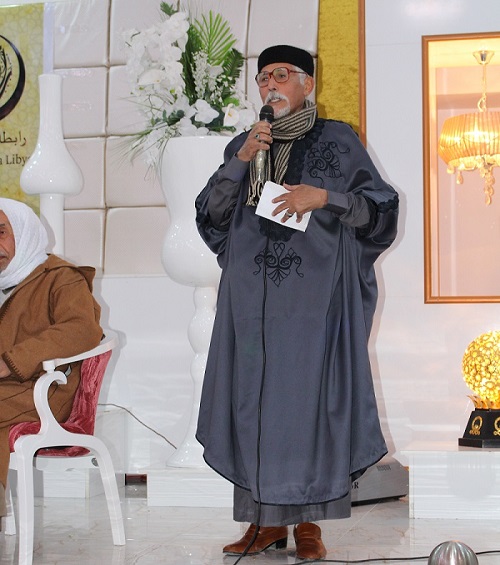Flags from Libya
The scholar, Dr.: Idris Fadil Saad Al-Haddad
Vice President of the Libyan Scholars Association.
He was born in the village of Jardas, south of the Green Mountain, in 1939. He studied at the Al-Midan School in Al-Bayda and the Al-Faidiyya School, then he attended the religious institute in Al-Zawiya Al-Bayda from 1953 until he graduated from the Faculty of Arabic Language at the Islamic University of Sayyid Muhammad bin Ali Al-Senussi in 1966.
He was appointed as a teacher in religious institutes, then middle and high schools, then in 1972 he was appointed as a teaching assistant at the College of Arabic Language, after which he was sent to study in the United States of America, where he obtained a master’s degree in Middle Eastern languages and cultures from the University of California in 1976, then obtained a doctorate in Arabic literature. from the University of Khartoum in 1998, and the subject of the thesis was (The Artistic Image in the Poetry of Ibn al-Rumi).
We are not exaggerating if we say that he was the instigator of linguistic and legal studies in the city of Al-Bayda. After the abolition of the Islamic University and religious institutes, he founded the Arabic Language Department at Omar Al-Mukhtar University in 1989, and on this department the College of Arts was founded. He also participated in founding the Department of Islamic Studies in 2006, and founded the Higher Institute. For Imamate and Oratory in 2000, which was transformed into the Higher Institute of Sharia Sciences, then into the College of Islamic Studies, then into the Islamic University of Sayyid Muhammad bin Ali Al-Senussi.
He was distinguished by his active presence in all fields of intellectual and cultural giving, as a teacher, mentor, and then as a university professor who holds all the literary and linguistic sciences in one grip. If you ask about the sciences of Sharia, he is a professor of rhetoric and interpretation, and a member of the Fatwa Committee. No wonder, he is one of the most prolific students who They were produced by religious institutes and the Islamic University.
He also stands out, through his conversations, articles, and writings, as a historian of the period in which he lived, a documenter of many facts and events, and a translator of many notables and personalities. What would you read if accuracy of observation, sharpness of memory, eloquence of pen, and magnificence of style were combined? He is a writer with a fluid pen, and an articulate orator whose words are eloquent, clear and strong, in addition to the fact that he is fluent in the English language, reading and writing.
He left a rich literary and historical heritage. In Rhetoric and Literature: He reviewed and presented the collection of the poet of the Green Mountain, Hussein Al-Ahlafi, and wrote a study on his life and poetry about the popular poet Jaafar Al-Habuni, and wrote about Ahmed Shawqi poetry and the poet. He also wrote brief notes on literature in the Abbasid era, which is a methodological book taught in the department.
Among the things that have not been published yet: the artistic image in the poetry of Ibn al-Rumi, Read to Write (a collection of articles he chose and presented), looks at the poetry of Abu Saif Muqarrab, The Ultimate Brief on the Issue of Miracles, lessons in rhetoric, and lectures on ancient literature.
He also wrote works that linked the successors to the predecessors, and preserved a great deal of the region’s history and cultural identity, thus serving as a link between the generations: Childhood Memories in the Village of Al-Faidiyya (1950, 1951), and a Night Out between Al-Saylas and Al-Ansari (1948-1952), and he completed it with the rest of the nightlife. Ayyam Dhari called it (Simple Stories between El-Jeneen and Farshita), in which he documented (the emergence of the city of Al-Bayda, the Islamic University, and the cultural movement there).
Among the things he wrote in this direction, and printed after his death: from the tales of Taktana, folded pages from the history of the Islamic University, and pages from the history of Massah in collaboration with the late: Dr. Saleh Kamsh also has political memoirs that are still in manuscript, which he began writing in 1984, when the Al-Jaghbub corner was demolished.
In the biographies of notables, he left several works, including: a book about the Mujahid Abdullah Abu Salloum, another about Al-Senussi Ibridan, a third about Hussein Taher, and a translation of Labaqa Mukhilah min Al-Watan Builders, about 50 scholars, written with the participation of Dr. Saleh Kamsh, and among those that have not yet been published: a book: Men and Events.
He also has several articles and research papers published under the title: Multidirectional Articles. He has: lectures on public speaking skills and methods, and lectures on the principles of interpretation, which have not been published yet.
Dr. Idris enriched the scientific and cultural life in his surroundings, in which he lived for more than half a century. He was full of active participation in the activities of the city of Al Bayda, its celebrations, and its social, religious, and political events, since he was a high school student in the fifties of the last century.
He was also known for his positions in support of the February 17 Revolution, and was famous for his calls for national reconciliation, healing rifts, and bringing peace. He was known for his opposition to extremist religious thought, and his clear positions in support of the army and police institutions.
He died – may God have mercy on him – as a result of his infection with the Corona virus, on the night of Friday, April 29, 2021 AD.


